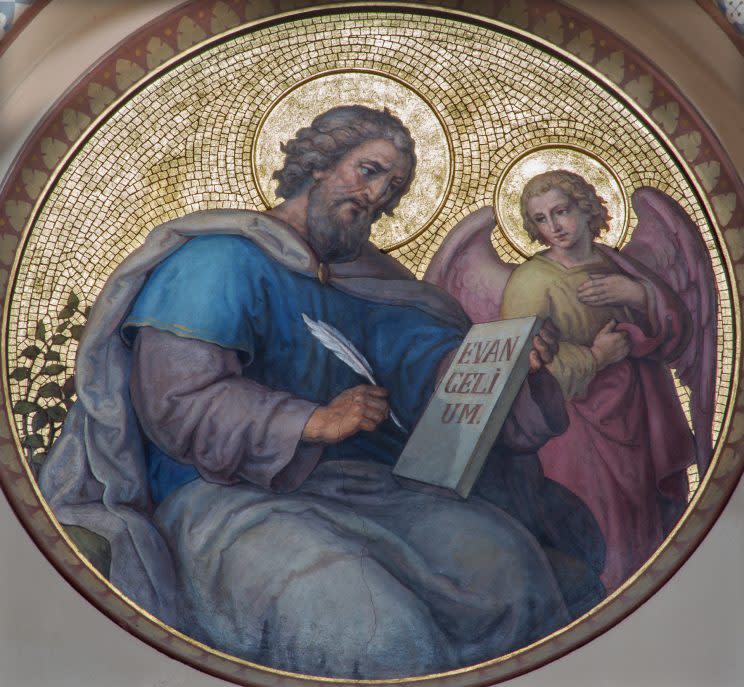‘The least of these’: Meals on Wheels, the Trump budget and the struggle over Matthew 25:40

It’s one of the best-known passages in the New Testament, even — or especially — among people who don’t usually read the Bible. And by last week, the conservative commentator and radio host Erick Erickson was getting tired of having it quoted to him: Matthew 25:40 (“The King will reply, ‘Truly I tell you, whatever you did for one of the least of these brothers and sisters of mine, you did for me.’), an evocative and stirring call to charity and compassion.
The sainted Mother Teresa herself was fond of quoting the verse to explain why she devoted her life to serving the poor. Even before the inauguration, a progressive faith group was promoting what it called the Matthew 25 Movement, seeking online signers to a pledge “to protect and defend vulnerable people in the name of Jesus.” In early March, when House Speaker Paul Ryan described the repeal of Obamacare as “an act of mercy,” Rep. Joseph Kennedy III, D-Mass., retorted that Matthew “reminds us that we are judged not by how we treat the powerful, but by how we care for the least among us.”
Throughout American history, momentous events (the Civil War, the civil rights movement) have had Biblical passages associated with them. The leading candidate for the Trump era so far seems to be the one whose alleged misinterpretation irked Erickson, the former editor in chief of RedState who now runs another conservative news site, The Resurgent.
And so when Erickson defended President Trump’s draft budget, specifically including cuts to programs that fund Meals on Wheels, Twitterdom responded with a deluge of tweets on the theme of his heartlessness in general and ignorance of Scripture specifically. Erickson responded by denouncing what he regarded as the secular-humanist tendency to quote Scripture only when it suits a progressive agenda (“If you don’t support Meals on Wheels, you’re not a good Christian, according to people who aren’t Christians and don’t believe in Jesus.”), and then delving into textual analysis, tweeting, “In Matt 25, when Jesus talks about caring for ‘the least of these,’ he isn’t talking about the poor in general, but fellow Christians.”
That touched off another wave of denunciations.

Matthew Dowd, the ABC analyst who was the chief political consultant for the 2004 Bush campaign, tweeted: “Please stop. You embarrass all of us who call ourselves Christians” (or, presumably, Matthews.)
In fact, I tweeted something mildly sarcastic myself.
Only afterward did I stop and ask myself: How did I know Erickson was wrong?
Matthew 25:40, it turns out, is a famously difficult and controversial passage, the subject of at least one book, numerous articles and contentious disagreements among biblical scholars. According to biblical scholar Diana Butler Bass, the “inclusivist” interpretation — that Jesus was referring to the poor and outcasts — was favored in the Eastern Catholic tradition and began gaining ground in the West with the ascendance of humanist beliefs and the rise of the Social Gospel in the 19th century.
But in an email exchange with me, Erickson referenced an older “exclusivist” tradition in Western Christianity:
“The prevailing wisdom in the early, renaissance, and reformation church era from Orthodox, Catholic, and Protestant writers was that the ‘least of these’ refers to Christians, particularly ministers and those sharing the gospel.”
Erickson cited an influential 2015 blog post by Denny Burk, a professor of biblical studies at Boyce College. Burk’s article was prompted by a “Leadership Summit on Overcoming Poverty” at Georgetown University, at which, he wrote, “I think every speaker on the panel — including President Obama — used the phrase ‘least of these’ to refer to our fellow citizens who live in poverty and who need help.”
Burk thinks that’s a misreading of the passage. As with any difficult biblical verse, you have to read it in context, he wrote. “In Matthew 18, Jesus refers to his disciples three times as “little ones” (vv. 6, 10, 14) with a term closely related to “the least of these” in Matthew 25:40, 46. So when Jesus talks about feeding, clothing, and caring for the “least of these” in Matthew 25:40, he’s talking about his disciples.”
And then Burk put it in a contemporary context: “This text is not about poor people generally. It’s about Christians getting the door slammed in their face while sharing the gospel with a neighbor. It’s about the baker/florist/photographer who is being mistreated for bearing faithful witness to Christ. It’s about disciples of Jesus having their heads cut off by Islamic radicals. In other words, it’s about any disciple of Jesus who was ever mistreated in the name of Jesus.”

Leaving aside Burk’s contentious views on the rights and obligations of a Christian wedding photographer, his broader point is a perfectly respectable — probably even majority — view among biblical scholars. But it is by no means universal. Jeannine Brown, a professor at Bethel Seminary in San Diego and a leading Matthew scholar, responded to Burk with an article titled “Where did the poor go?” In Brown’s view, the proper context for Matthew 25:40 is the surrounding passage, 25:31-46, which begins with Christ on his throne, dividing people into categories of the just and the unjust “as a shepherd separates the sheep from the goats.”
“Then the King will say to those on his right, ‘Come, you who are blessed by my Father; take your inheritance, the kingdom prepared for you since the creation of the world. For I was hungry and you gave me something to eat, I was thirsty and you gave me something to drink, I was a stranger and you invited me in, I needed clothes and you clothed me, I was sick and you looked after me, I was in prison and you came to visit me.’
“Then the righteous will answer him, ‘Lord, when did we see you hungry and feed you, or thirsty and give you something to drink? When did we see you a stranger and invite you in, or needing clothes and clothe you? When did we see you sick or in prison and go to visit you?’
“The King will reply, ‘Truly I tell you, whatever you did for one of the least of these brothers and sisters of mine, you did for me.’”
Why — to paraphrase Brown’s argument — should the righteous need to be reminded of what they did for the Lord? If they had given shelter or food to a disciple of Jesus — the people Burk and Erickson think the passage is about — that should stick in their minds, and their heavenly reward shouldn’t require an explanation. “It is this element of surprise that confounds a straightforward reading of ‘the least’ as Christian poor,” she writes. “The element of surprise makes most sense if those who received aid were not transparently believers in Jesus.”
In an interview, she adds: “The surprise helps keep us a little on our toes, and not so sure that we have it exactly right. … The point of the parable is we should be where Jesus is — in poor communities, in prisons. We’re supposed to be where Jesus is in these really surprising places.”
What is striking about this intense and passionate debate is that no one is disputing the larger point of Christ’s compassion for the poor, which is found throughout the New Testament. As Erickson told me in an email:
“I made clear in both prior and subsequent tweets that the Bible does require Christians to care for the widows, orphans, poor, and refugees (one reason I oppose the President’s immigration stance), but Matthew 25 does not.
“Using Matthew 25 is a case of using the wrong text to defend the right doctrine.”
Of course, Erickson is no liberal, and his view of caring for widows and the poor does not require paying taxes for it. He told me: “There is no dispute on helping the poor. The Bible commands it, but does not lay out how or if government programs are required. It is clearly a personal obligation of believers and the church community.”
But even with all good Christians on the same side of the larger question, what Brown calls “the tug of war” over Matthew 25:40 continues to play out. “The text is such a lightning rod, it’s such a powerful phrase. There’s a tug of war over this text, who gets to own it,” she says. Its power is what drew Mother Teresa, and countless missionaries throughout the centuries who devoted themselves to caring for the bodies as well as the souls of the “least among us.” Perhaps Trump, who has called the Bible his “favorite book,” could find inspiration in it as well.
Read more from Yahoo News:



